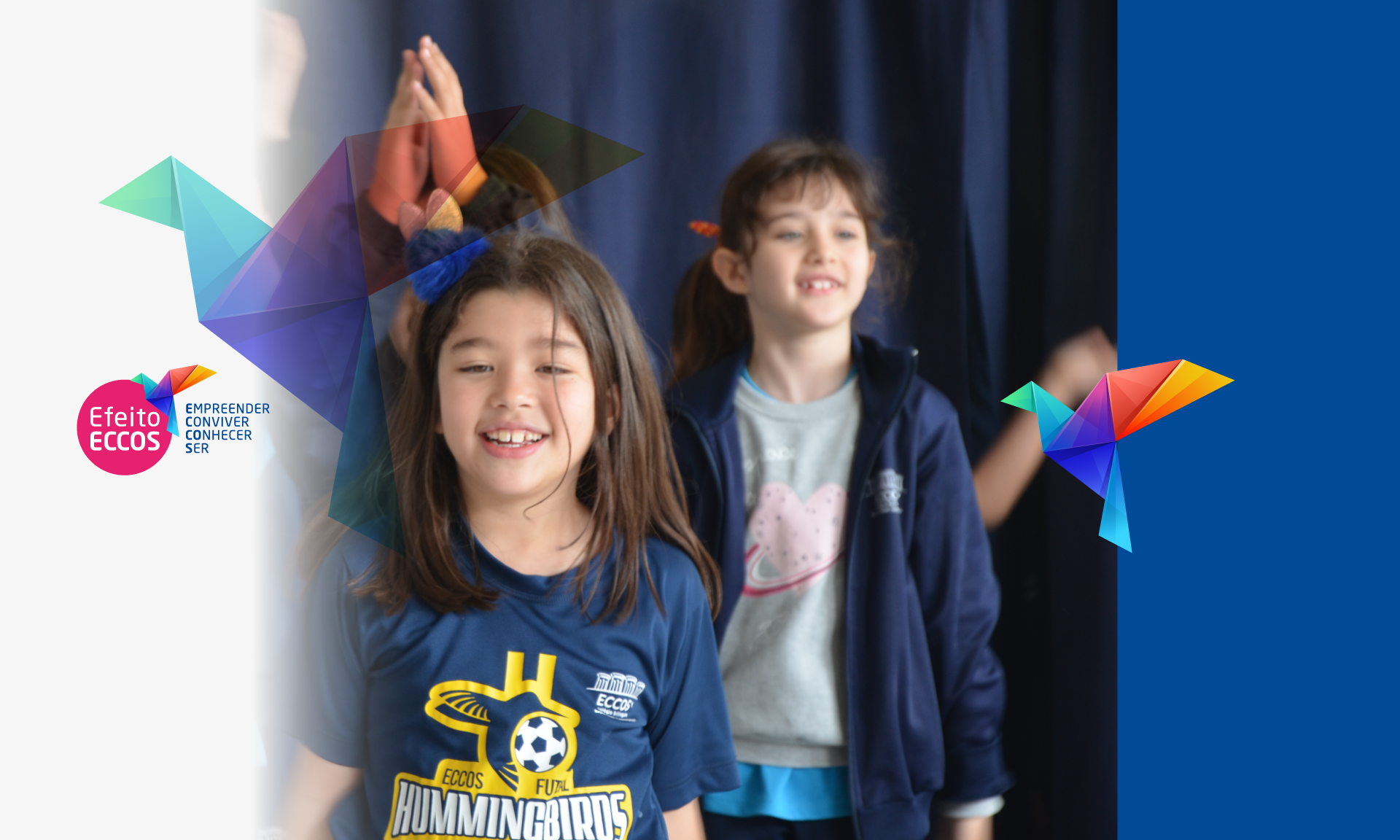
From necessity, ideas rise up… from ideas are projects born.
ECCOS’ permanent projects aim to bring pupils closer to reality, to organize the learning processes, to create promote knowledge and experience exchange, to explore possibilities and to develop a solidary.
Communication between the different areas of knowledge promote favorable conditions for both the individual and collective intellectual development.
In face of the uncountable challenges faced throughout this path, there are also many opportunities for pedagogical interventions that allow for collective reflection. As such, daily life becomes a vehicle for change with deep roots in the school culture in which all the community engages.
Permanent language projects
Reading, writing, speaking and listening are all aspects of language. The main idea in ECCOS’ language projects is bringing real context to the propositions so that the process reaches meaning to pupils. In doing so, they will recognize and value the products of their development — written essays, literary repertoire, and oral expositions. The didactic projects are potent opportunities pupils to become more aware of the challenges that they will face as users of languages. Since kindergarten, throughout the different languages, our projects guarantee the background for real life communication, such as the following ones:
- Tell me a Story (Conta pra Mim) — Quality reading habits since the early stages of schooling
Regularly, pupils from kindergarten participate in picking the books that they will take home with the intent that the families will promote a dynamic reading with their children. This way they establish a loving relationship with this practice. At school, they share these experiences with their friends and teachers and on the month of October, the families are invited over to tell stories for the group of children. - Literary Saturday (Sábado Literário) — Bringing up a community of readers
Students from primary and middle school have the opportunity to “follow” distinctive authors. Thus, they identify their particular markers on the texts and develop their preferences, becoming capable of selecting what they want to read. The socialization of this project takes place in one of the Saturdays of April, with the recommendations of the students comprising an exhibit for the community, based on the acquired repertoire. - Young Writer (Jovem Escritor) — Texts penned by the students spreading across multiple genres
The primary school classes are given a repertoire, throughout the year, accounting for different genres — tales, descriptions, biographies and autobiographies, childhood stories, magazines, poems, etc. This endeavor boost the writing of original works, which takes after the procedures that experienced writers use, such as: planning, textualization, revision and editing. The result of this process is a collective class book by these “Young Writers”. - ECCOS of the Poetry (ECCOS de Poesia) — Poetry as a relevant instrument of expression
Knowing different poems and poetries brings about the opportunity to recognize the taste within this textual genre, relevant for human sensibility. The sarau, cultivated at ECCOS since kindergarten, provides oral manifestations of such acquired preferences and is an important resource for developing their proficiency with language
ECCOS’ Science (ECCOS Ciência)
— Thinking, reflecting, formulating hypothesis and searching for solutions…
…are part of the makeup of the challenges presented to our pupils on their daily school life. ECCOS’ Science Fair is an event in which experimentation and investigation show up projects performed by the students throughout the school year. The ECCOS Science project also promotes the development of the scientific method and the integration of “children and parents” by means of exploration of a myriad of themes researched with the school guidance.
Kakari Project
— Being responsible for the collective, a process of forming citizens for the XXI century.
Kakari is a Japanese word and concept that means: “to be responsible”. Miss Hanae Sato, an exchange teacher from Japan, brought the idea to ECCOS in 2015, through our partnership with JICA (Japan International Cooperation Agency), it is now a part of the daily routine of our school. Its objective is to divide responsibility over the classes and other shared spaces of the school amongst the pupils by means of a rotation system. Its focus is to promote actions that instill a sense of responsibility, compromise, autonomy and cooperation either in the midst of a group or as an individual.
Responsible Consumption (Resta Ingesta)
— Small conscious actions can lead to great change.
This main goal of this project is to make school community aware of the impacts of food waste at home and at the school. Throughout the year, students from our Pre and After-Class Clubs’ programs:
- Prepare creative ways to spread the awareness to the community;
- Perform measurements of food waste and publish the results on the panels around the school;
- Repurpose the food waste for composting.
With this project, students and staff must face their share of responsibility and strive towards a conscious consumption by means of practical actions that reduce the waste and reutilize what eventually is left.
Volunteer actions and social work
— Bringing up an active, engaged and responsible citizenship.
Pupils are stimulated to participate in campaigns and projects that have a social impact every year, inspiring by the question: “How can I improve the world?” From kindergarten, our labor is to instill an awareness of the surroundings, to create solutions for day-to-day problems. ECCOS was recognized by the international Design for Change program for the “Memories” project. The precious life experience of the inhabitants of Santo Antônio Retirement Home, in São José dos Campos, resulted in a literary piece penned by our Year 7 students. Amongst other regular actions, the main ones are:
- Futsal Solidary Meetup (Encontro de Futsal Solidário) — ECCOS’ own Futsal Teams (‘The Hummingbirds’ and ‘The Huntinghanks’) with a special guest school or club from the city to gather toy donations;
- Coat Campaign (Campanha do Agasalho) — Opportunity to mobilize school community around the needs of those who can’t afford proper coats during the winter.
About us
Educational approach
Global citizenship
Teacher’s development program
